Here’s
Ben Affleck on Tech TV talking about filesharing. (Windows Media File – .asf)
(Thanks, Jason.)
Category Archives: RIAA Death Throes
The EFF’s Jason Schultz Explains The Privacy Implications Of The RIAA Subpoenas
This is from the August 23, 2003 program of “Bay Area People” on KTVU Channel 2 in San Francisco.
The Electronic Frontier Foundation‘s Jason Schultz explains why the RIAA’s Subpoena process raises several red flags in the areas of privacy and due process in terms of one’s rights being violated before it’s been proven that they’ve even broken the law).
Jason also explains the EFF’s How Not To Get Sued and Subpoena Database Query Tool websites and how consumers can use them to protect themselves against this travesty of justice.
Jason Schultz On The RIAA Subpoenas (Small – 19 MB)

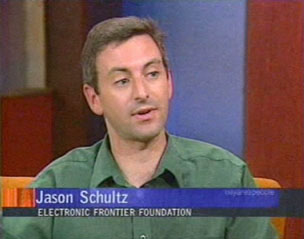

Anonymous File Swapper Fights Back Against The RIAA Subpoenas
File swapper fights RIAA subpoena
By John Borland for CNET News.com
An anonymous California computer user went to court Thursday to challenge the recording industry’s file-trading subpoenas, charging that they are unconstitutional and violate her right to privacy.
The legal motion, filed in Washington, D.C., federal court by a “Jane Doe” Internet service subscriber, is the first from an individual whose personal information has been subpoenaed by the Recording Industry Association of America (RIAA) in recent months…
The motion was filed by a pair of Sacramento, Calif., attorneys, who said the RIAA had gone too far in its effort to protect its online copyrights.
“This is more invasive than someone having secret access to the library books you check out or the videos you rent,” said Glenn Peterson, one of the attorneys, in a statement. “The recent efforts of the music industry to root out piracy have addressed a uniquely contemporary problem with Draconian methods–good old fashioned intimidation combined with access to personal information that would make George Orwell blush.”
The “Jane Doe” motion comes as the first individual legal response to the RIAA’s effort to sue large numbers of file swappers. It follows similar legal challenges from several ISPs and colleges, including Pacific Bell Internet Services, an SBC Communications subsidiary…
Critics of the unconventional subpoena process have noted that individuals whose information has been sought in other subpoena processes, such as potential libel cases, are given the legal opportunity to challenge the request for their personal information, however.
Ed Foster: Why The RIAA’s Subpoena Strategy Is The Beginning Of The End For DMCA Takedowns
RIAA Subpoenas and the Final Failure of the DMCA
By Ed Foster, Section The Gripelog
(via techlawadvisor.com)
The original intent of Congress was to prevent ISPs and other Internet services from having to police their users
Senator Calling For Investigation of RIAA Crackdown
Senator to hold hearings on recording industry’s piracy crackdown
By Frederic Frommer for the Associated Press.
A Senate panel will hold hearings on the recording industry’s crackdown against online music swappers, the chairman said Thursday.
Sen. Norm Coleman, R-Minn., made the announcement in a letter to the Recording Industry Association of America. He had received information he had requested from the group about the campaign, which Coleman has called excessive…
The association announced plans in June to file several hundred lawsuits against people suspected of illegally sharing songs on the Internet. Copyright laws allow for damages of $750 to $150,000 for each song…
Coleman said he is concerned the campaign could ensnare innocent people, such as parents and grandparents whose computers are being used to download music by their children and grandchildren. He also said that some downloaders themselves might not know they are breaking the law.
Coleman has admitted that he used to download music from Napster, the file-sharing service that a federal judge shut down for violating music copyrights.
He wrote that as subcommittee chairman, he intends “to assist in the development of remedies that will be reasonable and narrowly tailored to fit the extent of infringement.”
…Last month, Coleman asked the industry association to furnish him with a list of its subpoenas; its safeguards against invading privacy and making erroneous subpoenas; its standards for issuing subpoenas; and a description of how it collects evidence of illegal file sharing.
The EFF’s Wendy Seltzer vs. Howard Berman On CNN
Wendy vs. Howard Berman on CNN’s Next@CNN, August 9, 2003.
Next@CNN – Criminal Intent – Complete (Small – 21 MB)
Next@CNN – Criminal Intent – Part 1 of 2 (Small – 10 MB)
Next@CNN – Criminal Intent – Part 2 of 2 (Small – 11 MB)
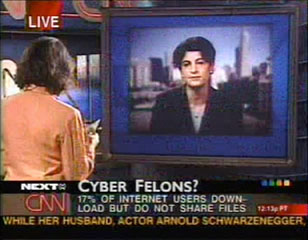
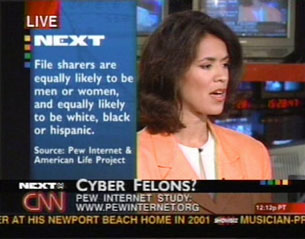
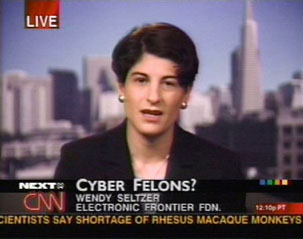
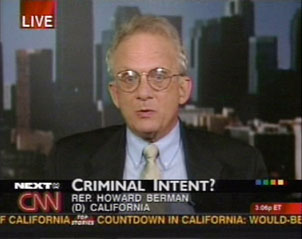
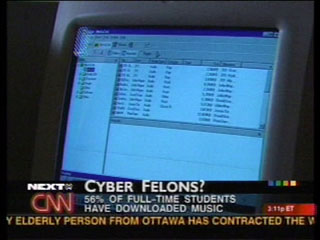
Judge Rejects RIAA Subpoenas In Boston College-MIT Case
Judge rejects subpoenas in music-use case
By Bipasha Ray for the Associated Press.
A federal judge rejected an attempt by the recording industry to uncover the names of Boston College and MIT students suspected of online music piracy.
U.S. District Judge Joseph L. Tauro said Friday that under federal rules, the subpoenas, which were issued in Washington, cannot be served in Massachusetts.
The two schools filed motions last month asking the judge to quash the subpoenas, which request names and other information for one Massachusetts Institute of Technology student and three BC students who allegedly obtained music using various screen names.
KQED Forum On P2P Filesharing – The Great Download Debate
Show: KQED Forum
Title: The Great Download Debate
Time: 10 am
Date: July 30, 2003
Guests include the EFF‘s Jason Schultz, Mitch Glazier of the RIAA, Alex French, Minority Council on the House Judiciary Committee, and Joseph Menn of the LA Times and author of All The Rave.
I’ve made it available as a single file or in three parts.
I’ve made aiffs of everything available in the directory too.
KQED Forum On P2P – Complete (MP3 – 73 MB)
KQED Forum On P2P – Part 1 of 3 (MP3 – 26 MB)
KQED Forum On P2P – Part 2 of 3 (MP3 – 26 MB)
KQED Forum On P2P – Part 3 of 3 (MP3 – 23 MB)
RIAA More Powerful Than Police
Stop or I’ll sue
Here’s why the record industry is now more powerful than police.
By Dave Ralis for phillyBurbs.com
Under the fourth amendment to Constitution, police must show probable cause that a crime has been committed before they can get a judge’s permission to search your home for evidence, or subpoena you to appear in court.
But under the federal Digital Millenium Copyright Act, all the RIAA has to do is file paperwork with a court clerk to get a subpoena if it suspects you of downloading a song from the Internet or sharing music in a peer-to-peer network such as Kazaa, WinMX or Grokster.
Anyone found in violation of the act could faces a lawsuit from the RIAA seeking $750 to $150,000 per song, The Associated Press has reported.
Daily Show On The RIAA’s Suing It’s Own Customers
This is from the show that aired Monday, July 28, 2003.
The Daily Show On RIAA’s Funny Commercials and Suing It’s Own Customers (Small – 7 MB)
The Daily Show (The best news on television.)